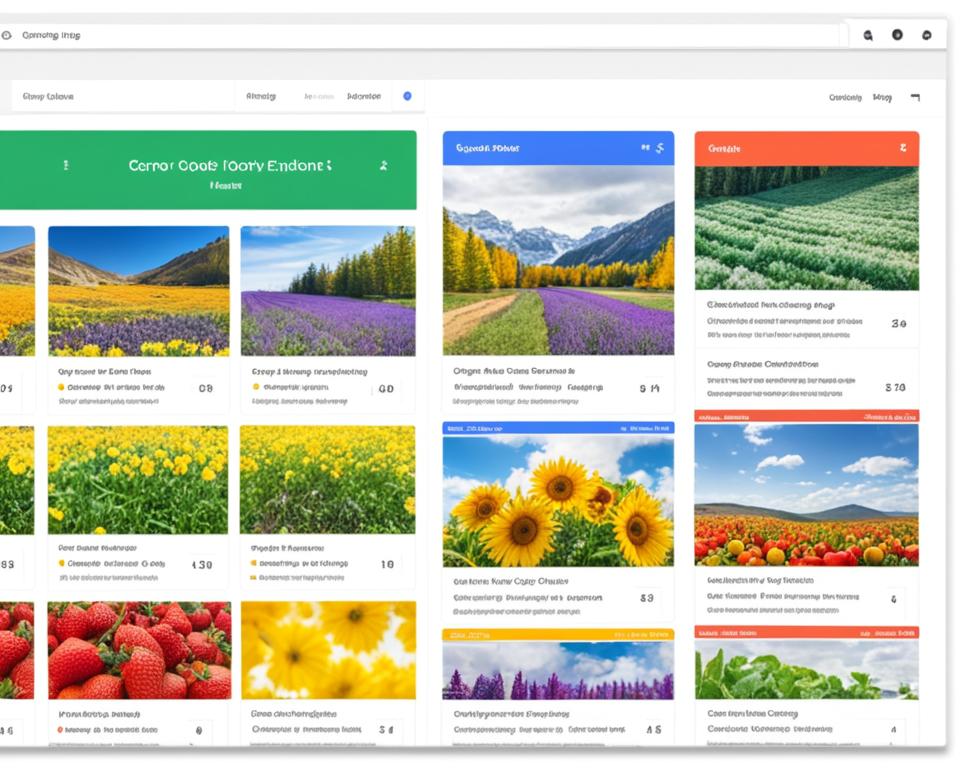
Unlocking Google’s Secrets: Dominate Web Searches with These Expert Tips!
Web search on Google helps users worldwide find information online. It’s vital for webmasters and SEO experts to follow Google’s spam rules. This way, they keep their site’s Google ranking safe and improve how people search. Ethical SEO methods and tips for Google search lead to lasting success online.
Google web search is always changing, including how it fights spam. To deal with this, make sure your content and SEO follow Google’s rules. This ensures top-notch search results for users. Both newbies and pros in SEO need to know these policies. It helps them boost their search presence without using spammy tricks.
Key Takeaways
- Adherence to Google’s spam policies is critical for maintaining your site’s search ranking and reputation.
- Implementing ethical SEO enhances user experience and complies with Google’s guidelines for web search.
- Manual reporting of spam plays a significant role in upholding the quality of Google web search.
- Learning effective Google search tips is beneficial for webmasters to stay ahead in search optimization.
- Avoidance of spammy tactics is essential to ensure your site’s longevity and credibility on the web.
Understanding Google’s Overall Policies Against Spam
Learning about digital rules is key to a fair internet for all. Google leads this charge with its strong spam policies. These rules help keep search results honest, which is crucial for everyone online.
Automated and Manual Review for Spam Detection
Google uses automated systems and people to spot spam. This mix helps check web content and user actions carefully. Algorithms catch new spam tactics, and human reviewers add understanding to tough situations.
Consequences of Violating Google’s Search Policies
Breaking Google’s spam policies can have big penalties. Sites might drop in rankings or get kicked off Google’s search results. Following Google’s rules is vital for a healthy internet space.
How to Report Spam on Google Web Search
Google lets users help by reporting spam. If you see a page breaking the rules, you can send in a report. These reports help Google get better at catching spam, making searches safer for us all.
To use the web wisely, knowing Google’s spam policies is important. Understand spam detection, the consequences of breaking rules, and how to report spam on Google. This knowledge keeps Google’s information clean and useful for everyone.
Protecting Your Content from Cloaking Practices
Understanding cloaking practices is crucial in today’s SEO world. It’s about showing different content to users and search engines. This can mess up your site’s rankings and may lead to penalties. Let’s explore what makes cloaking good or bad. We will also cover how to make content accessible to bots and handle cloaking issues.
Distinguishing Between Legitimate and Deceptive Cloaking
We need to know the good from the bad in cloaking. Good cloaking helps users with disabilities without tricking search engines. Bad cloaking, though, tries to trick the system. It breaks search engine rules. Knowing why you’re cloaking is key to sticking to best practices and helping users genuinely.
Recommendations for Making Content Accessible
Making sure both users and search engines can access your content is vital. This means making JavaScript or dynamic content readable by search engines. Also, offer text alternatives for images. The goal is to balance engaging content for people and searchable content for engines, making the web friendly for everyone.
Handling Cloaking Issues on Hacked Sites
When hackers use cloaking, it’s to hide their actions. They show bad content to users but not to search engines. If your site gets hacked, act fast to fix security, remove bad content, and make things right with search engines. Staying alert and responding quickly is critical for your site’s and visitors’ safety.
The Truth About Doorways and Google Search Engine Optimization
Doorways have sparked debate in the world of Google Search Engine Optimization. They are made to do well in Google searches for certain questions but often send visitors through many steps before they get to the right place. This method used to help websites rank better. But now, experts see it as bad for the website’s rank and the user’s experience.
It’s time to stop using old, harmful strategies for optimize web search. Google’s smarter algorithms now emphasize the need for clear, helpful, and easy-to-use content.
“Creating multiple pages or websites that essentially funnel visitors to a single destination undermines the very essence of user experience, and it is precisely such practices that Google’s updates seek to demote.”
- Doorways often make navigating a website hard and confusing.
- The main aim of Google Search Engine Optimization should be to make sites easy to use and align with what users want.
- Authentic, interesting content builds a strong base for visibility in searches and making users happy.
Think from the user’s point of view: they want answers and solutions that are easy to find. Using doorways makes finding information like being in a maze. But, making content that really helps users leads to more interaction and better search positions.
In this time where good content rules, website builders and marketers must listen to Google. The message is clear: focus on quality, clarity, and value. This approach will not only improve your website’s search performance but also build trust with your visitors.
Expired Domain Abuse and Its Impact on Web Search
The digital world’s dark side shows a troubling trend known as expired domain abuse. This act threatens how we find information online. Such abuse takes former reputable domains and uses them to skew search results. This problem arises from using a domain’s old respect and links to promote low-quality content. It confuses people searching online, harming their experience.
How Expired Domains Can Manipulate Search Rankings
Expired domain abuse means tricking search engines into trusting these old sites. Attackers fill these sites with poor content rich in keywords. This wrongly boosts the site’s visibility. It’s a tactic that undermines the trust users and search engines have in the Internet. Clearly, it’s something Google fights against to keep online information genuine.

Recognizing and Preventing Expired Domain Exploitation
Webmasters and domain owners must stay alert to combat expired domain exploitation. Watching for sudden content changes or unusual links helps spot trouble. Also, anyone buying a domain should research to avoid fueling bad practices.
Everyone involved in the web has a role in protecting search quality. Knowing about and acting against expired domain abuse are crucial. This helps maintain the trust and truth in online searches.
Mitigating the Risks of Hacked Content in Google Web Search
Today, hacked content worries both site owners and visitors. Google works hard to keep its search safe and relevant. This makes it crucial to mitigate risks from hacked sites quickly. Doing so helps protect your website’s rank and keeps your online space trustworthy.
What Constitutes Hacked Content
Hacked content shows up as unexpected changes on your site. You might see new, odd pages or links pointing to sketchy websites. This hacked content hurts your site’s trust and can push you down in Google’s search results.
Techniques for Fixing Hacked Sites
- Start by removing malicious code: Scan your site with security tools to find and delete bad scripts or files.
- Update and patch: Keep your software, plugins, and themes updated to avoid known security holes.
- Change passwords: Update your server, admin panel, and database passwords to keep out hackers.
- Seek professional help: If you can’t fix it alone, get help from cybersecurity experts.
- Clean and restore: Use clean files to replace the hacked ones and restore your site from backups if you have them.
- Google Reconsideration Request: After fixing your site, ask Google to review your site to restore your good standing.
Keeping your website secure is key to staying safe from cyber threats. Watch your site closely, use strong security practices, and know how to fix issues. This strategy helps keep your site safe from hackers and maintains your spot in Google’s search results.
Navigating Hidden Text and Links while Optimizing Web Search
Creating web content often brings the temptation to use hidden text and hidden links. This may seem like a shortcut to boost a site’s visibility. But search engines like Google view these tactics as deceptive. When working to optimize web search, it’s crucial to understand the negative impact of these practices.
Google’s crawlers are great at finding hidden text and hidden links. If a website shows one thing to Google but something else to visitors, it could get penalized or even banned. To keep the web honest and open, it’s key to follow rules that support clarity and truth.
- Google’s crawlers continually scan the web to find and index new pages.
- It’s vital that Google’s crawlers can access and correctly interpret content.
- Helping both users and search engines by having clear URLs and logical site organization is important.
- Using consistent URLs and avoiding copying content ensures users have a good experience and helps Google crawl efficiently.
Most websites seen in Google’s search results got there by being honest. They provide useful content and earn links naturally instead of using hidden links to trick the system.
Making content that is both interesting and helpful is key to improving a website’s search ranking.
To better optimize web search, we recommend these steps:
- A detailed sitemap with all URLs helps Google find your content.
- Using the URL Inspection Tool in Search Console lets you check how Google sees your pages.
- Putting similar content together helps Google understand what your pages are about.
Webmasters should know that changes to websites don’t show up in search results right away. Some updates appear in a few hours, while others might take months. Success comes from being patient and sticking to best practices.
It might look hard to attract visitors without using hidden text and hidden links, but you can optimize web search the right way. Do this by creating easy-to-find, quality content that truly meets users’ needs and follows Google’s rules for an honest web.
Effectively Utilizing Keywords without Stuffing
In today’s digital world, smart keyword use is key for being seen online. But too much can lead to Google penalties. This prompts the question: how do we include keywords smoothly? Knowing when and how to use keywords right and making good content is critical for SEO success.
What Is Keyword Stuffing and How to Avoid It
Keyword stuffing means cramming too many keywords onto a page to rank higher in search results. Google’s smarter now, penalizing this tactic. Good content focuses on quality over keyword quantity. To steer clear of keyword stuffing, match keywords with user needs and blend them into your content naturally. This keeps readers happy and meets search engines’ advanced ranking criteria.
Creating Valuable Content with Appropriate Keyword Usage
Our aim is to make content that readers love and search engines promote. SEMRush shows engagement, like visits and time on site, matters more than just keywords. Top pages often have keywords in the text and titles. This shows right keyword use matters. When we use keywords properly in detailed, well-researched content, it improves user experience and SEO.
In focusing on great content, keyword relevance is just one part. Keywords must fit your content naturally. This not only makes reading easier but also fits search engines’ detailed checks.
Keywords work best when used thoughtfully. This includes putting them in your title and meta description carefully since quality content matters more. By focusing on creating useful and detailed content that meets users’ needs, we include keywords naturally. This matches Google’s ranking system.
The main goal is ensuring users find what they need. This goes beyond just using keywords. By offering real value, rich in context, and by avoiding keyword stuffing, your content will naturally succeed with both readers and search engines.
Strategies to Identify and Avoid Link Spam
Understanding link spam is key for website owners aiming for top search engine rankings. Google can penalize sites deeply for this, leading to less visibility or even removal from search results. It’s vital to know how to spot link spam to keep your site’s link quality high. Let’s explore how to find and avoid harmful link practices.
To avoid link spam, knowing the types is the first step. Google warns against buying or selling links for higher ranking. Too many link exchanges or using poor-quality directories can also be harmful. By recognizing these actions, you can check your site’s links and fix issues quickly.
- Check your site’s backlinks regularly to find any suspicious patterns that suggest link spam.
- Use reliable SEO tools to check the quality and relevance of links coming to your site.
- Watch the links going out from your site to avoid accidental link exchange schemes.
Since Google might not list websites that break its rules, stopping identify link spam is critical. The best linking strategies involve creating great content that earns natural backlinks. Forming good relationships with well-regarded people in your industry can help you get high-quality links that boost your site’s credibility.
Remember, a strong SEO strategy focuses on the user and adding value. Avoid sneaky tactics to ensure your site is valued for its true contributions, not penalized for link spam.
Google uses both automation and human checks to find and deal with sites breaking rules, including many spam techniques. This can range from hidden content to malicious software. To avoid trouble, be proactive in managing your site and following SEO best practices.
Always aim to build a site that values clearness, user-focused content, and earning links the right way. The dangers of link spam aren’t worth short-term wins, as Google gets better at enforcing its rules. With knowledge and tools, like those in Google’s spam policy guidelines, you can protect your site from link spam’s risks.
Avoiding Machine-Generated Traffic Pitfalls for Better Google Search Results
In today’s digital world, being seen on search engines is critical for businesses. It’s key to avoid the dangers of machine-generated traffic. This type of traffic comes from banned automated methods that skip real human engagement. It hurts the trust in user experience.
Examples of Prohibited Automated Traffic
Websites caught using machine-generated traffic are breaking the rules, as per Google. This includes sending auto queries to Google or scraping search results without permission. Doing so breaks Google’s rules and messes up traffic data analytics, leading to less reliable insights.
Implications of Machine-Generated Traffic on User Experience
The link between user experience and search results is huge. Prohibited automated traffic can mess up user metrics, give wrong data for content planning, and hurt real visitors’ site experience. Keeping web content focused on users is key for success in how search works. Google works hard to tweak its algorithms to better serve users, giving relevant and helpful search results.
- Machine-generated traffic lowers the quality of interaction data.
- Real, authentic traffic is vital for good analytics.
- User experience is improved with real, human activity.
Knowing how Google’s crawling, indexing, and serving works shows the need for real content and interaction. Let’s focus on improving our digital presence in a responsible way. Let’s avoid machine-generated traffic. This will help our users and our websites’ organic growth.
Handling Ads on Pages that Comply with Google Web Search Spam Policies
The SEO world keeps changing, and Google helps by setting rules for ads on pages. These rules aim to ensure ads and quality content go well together. For those managing websites and ads, it’s crucial to blend ads into content without breaking Google’s spam rules. Google keeps improving its system to make sure only the best content gets noticed.
Creating Content that Upholds Google’s Spam Policies
Making content that sticks to the rules is a big deal. It means making something valuable every time. Google announced an update in March 2024, as shown in their official announcement. They plan to cut down on non-original content by up to 40%. This highlights how vital fresh and engaging content is. Webmasters need to watch out for things like using expired domains to boost rankings, which Google now sees as spam.

The Relationship between Google Ads and Organic Search Rankings
Many people think that Google Ads on a page improve its organic search ranking. But Google keeps things fair by judging content and ads separately. Websites are okay to have ads if they stick to the spam rules. These rules help make sure the focus is on quality content for users.
To do well with both Google Ads and organic rankings, link your ad and content strategies. Ads should improve the user’s experience and fit well with the content. By following Google’s advice, website owners can create a user-friendly place. This approach can also boost organic rankings naturally.
Conclusion
The integrity of Google web search is protected by strict spam policies. These rules help make the internet safer for everyone. Following these policies is about building trust and ensuring users have a good experience. Spam can hurt a site’s visibility and trustworthiness.
Updates from Google Trends show how the digital world is changing. Page experience signals and Core Web Vitals updates are crucial for website owners. They help improve sites for better user interaction and performance.
To wrap up, it’s key to understand Google’s spam rules and search dynamics. Using the right data helps site owners keep up with Google’s expectations. The aim is to offer great content that’s easy to find for the audience.
Conclusions
What are some tips for understanding Google’s spam policies for web search?
Learning about Google’s spam policies for web search is necessary. Start by knowing the overall policies. Know how Google uses both automated and manual reviews to find spam. It’s vital to follow these policies to avoid bad consequences and know how to report spam.
How does Google detect and address spam on its search engine?
Google has both automated systems and a team that reviews content to spot spam. They check web content and activities for rules violations. This helps keep search policies intact.
What are the consequences of violating Google’s search policies?
Breaking Google’s search rules can lead to penalties. You might see lower rankings or get removed from search results. Following these policies is key to maintaining good search results and experiences for users.
How can I report spam on Google web search?
You can report spam to Google’s web search using search quality user reports. Reporting helps Google catch spam better. This keeps the search results clean and reliable.
How can I protect my content from cloaking practices?
It’s important to know the difference between good and bad cloaking. Make sure search engines can find your content. Take care of cloaking issues, especially on sites that have been hacked.
What are doorways and how do they relate to Google search engine optimization?
Doorways are sites or pages made to rank high for certain searches. They don’t really help users and don’t follow Google’s SEO guidelines. Create helpful and relevant content instead.
How can I recognize and prevent expired domain abuse?
Expired domains are sometimes misused to tweak search rankings. Be aware of such tactics. Taking steps in advance can protect you from such misuse.
What should I do if my website has hacked content?
If hackers target your website, act fast to find and fix security gaps. Cleaning malicious code, fixing security holes, and asking for a search review are steps to take. This helps get your search ranking back.
How do hidden text and links affect web search optimization?
Hidden texts and links trick search engines and are not allowed. Instead, make content valuable and easy for users to find. Don’t use hidden texts or links.
What is keyword stuffing and how can I avoid it?
Keyword stuffing means too many keywords on a website. Create quality content that uses keywords right. Avoid overdoing keywords.
How can I identify and avoid link spam?
Link spam uses fake practices to add too many links to a site. Watch out for and avoid such tactics. This helps keep your site’s link profile strong and trustworthy.
What are the implications of machine-generated traffic on Google search results?
Machine-generated traffic uses too many resources unfairly, breaking Google’s spam rules. It hurts the user experience. Don’t create such automated traffic.
Can I display ads on my website without violating Google’s spam policies for web search?
Yes, you can show ads if you follow Google’s spam rules. Just make sure your site’s content sticks to these rules. It should add value and be honest with users.
Following Google’s web search spam policies is crucial for a great online presence and happy users. Stick to the guidelines shared. This will help avoid spamming, protect your work, and rank better on Google searches.














